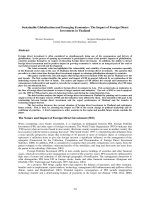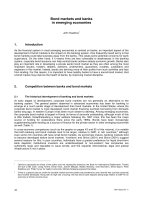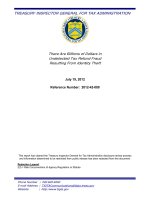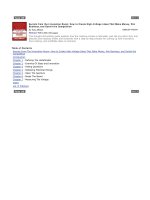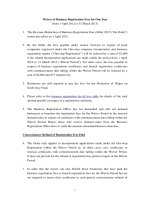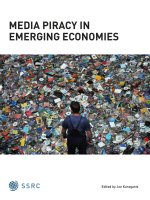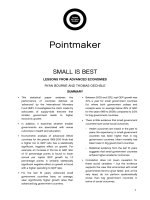caliyurt & idowu (eds.) - emerging fraud; fraud cases from emerging economies (2012)
Bạn đang xem bản rút gọn của tài liệu. Xem và tải ngay bản đầy đủ của tài liệu tại đây (10.63 MB, 199 trang )
Emerging Fraud
.
Kıymet C¸ alıyurt • Samuel O. Idowu
Editors
Emerging Fraud:
Fraud Cases from Emerging Economies
Editors
Kıymet C¸ alıyurt
Trakya Universitesi
I
˙
ktisadi ve I
˙
dari Bilimler
Fak
€
ultesi I
˙
s¸letme B
€
ol
€
um
€
u
Balkan Yerleskesi
Edirne
Turkey
Samuel O. Idowu
London Metropolitan University
London Metropolitan Business School
London
EC2M 6SQ
United Kingdom
ISBN 978-3-642-20825-6 e-ISBN 978-3-642-20826-3
DOI 10.1007/978-3-642-20826-3
Springer Heidelberg Dordrecht London New York
Library of Congress Control Number: 2012931328
# Springer-Verlag Berlin Heidelberg 2012
This work is subject to copyright. All rights are reserved, whether the whole or part of the material is
concerned, specifically the rights of translation, reprinting, reuse of illustrations, recitation, broad-
casting, reproduction on microfilm or in any other way, and storage in data banks. Duplication of this
publication or parts thereof is permitted only under the provisions of the German Copyright Law of
September 9, 1965, in its current version, and permission for use must always be obtained from Springer.
Violations are liable to prosecution under the German Copyright Law.
The use of general descriptive names, registered names, trademarks, etc. in this publication does not
imply, even in the absence of a specific statement, that such names are exempt from the relevant pro-
tective laws and regulations and therefore free for general use
Printed on acid-free paper
Springer is part of Springer Science+Business Media (www.springer.com)
Foreword
I have been privileged to attend the annual International Confer ence Series on
Governance, Fraud, Ethics and Social Responsibility (IConGFE&SR) organized by
Assoc. Prof. K{ymet Tunca C¸al{yurt who is Manager of the Social Graduate School
of Trakya University. These meetings have always provided enormous interest to
anyone interested in fraud risk management and forensic accounting. Not only are
papers presented by academics but also by regulators, civil servants, and
investigators.
Fraud and white-collar crime are prevalent across both developed and develop-
ing countries. Both the explicit costs (in terms of detection, investigation, prosecu-
tion, recovery, and prevention) and implicit costs (in terms of the impact they have
on the safety by which ordinary economic transactions are conducted and savings
and investment are made) are enormous.
Even though there are many cultural and regulatory differences across countries
and states these costs are always high. What may be ethica lly acceptable in one
country may not be in another, and what may be unlawful in one may not be in
another. In any meaningful study of the nature of the fraud and its consequences, it
is necessary therefore to understand a sufficient amount of detail as to how the fraud
was perpetrated. The cases presented here contain that.
As a result of internationalization, cross-country frauds are becoming increas-
ingly common. They are not restricted to identity theft and credit card fraud but
most other conventional frauds, thefts, and scams. This raises many new problems
for prosecutors and legislators. These frauds are not only facilitated by the Internet,
but it also makes them much easier to perpetrate. In the past, the ability to be a
confidence trickster involved a variety of skills. Now, the Internet enables the
perpetrator not only to avoid face-to-face contact but provides him (or her) with
complete anonymity. Documents no longer need to be “forged”; a simple scan may
be sufficient. Perpetrators no longer even have to develop scams; copycat frauds
and scams are rife. These developments not only make perpetration easier and
cheaper, but also remove the individual from ethical awareness and responsibility,
allowing him (or her) to hide behind the computer screen.
It is sometimes the case both in corporations and in business education that these
matters are ignored, sometimes to the extent that as if they do not exist. But what is
v
the point in wealth creation if it is stolen from you? Such denial is not healthy.
These problems and issues need to be confronted and combatted. This book can
only help and I commend it to you.
Sydney, Australia Paul Barnes
vi Foreword
Preface
Fraud is a scary and unacceptable practice in any business environment. To pretend
that fraudulent practices are not rampant in this modern age of the Internet, where it
is possible for anyone, anywhere in the world with easy access to a personal
computer (PC) or cellphone, to hide behind these gadgets and easily transact
business across national borders using the world wide web (www), is to demon-
strate a high level of ignorance about life in the twenty-first century. This is perhaps
a micro perspective of the problem.
Fraud is not only a phenomenon of the Internet; in other words, fraud is not only
committed by those you did not know or have never met—total strangers. Recent
well-publicized cases of fraudulent acts by some senior execu tives of companies
which have led to serious consequences in some developed economies and perhaps
some unpubl icized ones by corrupt and dishonest employees and senior executives
in many developing economies provide us with enough evidence to believe that the
crime is probably a global one. This, so to speak, is our understanding of the macro
level of the problem and the area most of the chapters in this b ook have focussed
on—executive and employee perpetrated fraud.
From what has been said in the two preceding paragraphs above, our readers
would probably have been forewarned that fraudulent practices are not only aimed
at or perpetrated against individuals through either the Internet or some other means
but also against corporate entities by either total strangers or their own employees
and some senior corporate servants. This was why we believe that the publication of
a book such as this one would be a welcome reading around the world in order to
alert corporate leaders, legislators, and other stakeholders of the real threat the
problem poses to both the bottom line corporate survival and economic develop-
ment of nations.
When fraudulent acts are committed against a corporate entity, a host of its
stakeholders are adversley affected in one way or another. Its shareholder’s wealth
is eroded, employees might end up losing their jobs and future livelihood, suppliers
and loan creditors might end up getting little or nothing when the entity folds up due
to insolvency, the government might lose revenues from corporate and personal
taxes and in addition must bear the social costs of the ensuing social and economic
problems, customers might end up losing a valuable supply source for goods and
services, and even the local community might experience a decline in people’s
vii
prosperity and consequently have to face a series of social and economic problems.
The chain of resulting consequences might be endless.
The resulting problems are ever ybody’s business; it is therefore important that
we should all pull resources together to find solutions to this unacceptable “white-
collar” crime as it is sometimes called which directly or indirectly affects us all.
London, UK Samuel O. Idowu
Edirne, Turkey Kıymet Tunca C¸ alıyurt
viii Preface
Acknowlegments
Our first “thank you” goes out to all those who have assisted us in making the
publication of this edition of the book a reality—our contributors who are stationed
in different countries around the world. We are indeed very grateful to you all.
We would also like to thank to members of the International Group on Gover-
nance, Fraud, Ethics and Social Responsibility and the Scientific Committee
members of the International Conference.
They have also ensured the success of the publication.
We would equally like to thank some of our friends and colleagues for being
there for us during the preparation and final stages of the book. Maurice Pratt of
London Metropolitan Business School, UK, thank you for reading one of the
chapters for us.
Finally we would like to thank our respective families for their unwavering
support when things became a bit more challenging for us as a result of our other
commitments.
Sponsored By
ix
International Group on Governance Fraud Ethics & Social Responsibility
(IGonGFESR)
International Conference on Governance Fraud Ethics & Social Responsibility
(IConGFESR)
x Acknowlegments
Contents
Part I A General Overview of Fraud
1 Reporting Fraud Using the Fraud-Free Company Model: A Case
for the SMEs in Emerging Economies? 3
Kıymet Tunca C¸ alıyurt
2 Fraud Detection and Forensic Accounting 19
Fatma Ulucan O
¨
zkul and Ays¸e Pamukc¸u
3 A Critical Analysis of the Effects of Measurements on
International Company Scandals: The Fraud Act 43
Nermin C¸ ıtak
4 Forensic Accounting for Financial Malpractices in Developing
Countries: An Analytical Review of the State of the Art 65
Abubakar S. Kasum
5 The Double-Way I
˙
nterrelationship Between the Shadow Economy
and the Economic Growth (GDP Rate) 75
Alexandru Trifu
6 What is Hawala? An Introduction to the Multi-Billion Dollar
Informal Value Tranfer System 85
M. Nauman Farooq i
Part II Country Specific Cases from Emerging Economies
7 Fraud as a Distinctive Part of Management Mistakes in Countries
in Transition 99
Drago Dubrovski
8 Corporate Fraud: Auditors’ and Managerial Liability 115
Harpreet Kaur
9 The Effect of Corruption on Country-Level Investment:
The Case of Pakistan 133
Raheel Gohar, Muhammad Shariq, and Fazli Azim
xi
Part III Fraud from Two Professional Perspectives
10 Fraud in Modern Banking: Highlights on Online Internet
Banking Fraud 149
Asli Y
€
uksel Mermod
11 Fraud in Marketing and Consumption Pract ices 163
€
Ulk
€
uY
€
uksel
Part IV Concluding Remarks
12 Emerging Fraud: The Summing Up 179
Samuel O. Idowu
Index 183
xii Contents
About the Editors
Assoc. Prof. Dr. Kıymet Tunca C¸ alıyurt
Assoc. Prof. Dr. Kıymet Tunca C¸ alıyurt graudated from the Faculty of Business
Administration and Economics, Marmara University, Istanbul, Tu rkey. Her Mas-
ters degree and Ph.D. are in accounting and finance from the Social Graduate
School, Marmara University. Her research interests are in accounting, auditing,
fraud, social responsibility, corporate governance, finance, and business ethics with
special interest in NGOs and aviation management. She is the founder of the
International Gr oup on Governance, Fraud, Ethics and Social Responsibility
(IGonGFE&SR) and the president of the National-International-Students’ Confer-
ence Series on Governance, Fraud, Ethics and Social Responsibility (IConGFE&SR).
She has published papers and book chapters both nationally and internationally on
fraud, social responsibility, and ethics in accounting/finance/aviation disciplines and
NGOs.
Samuel O. Idowu
Samuel O. Idowu is a senior lecturer in accounting at the city campus of London
Metropolitan Business School, London Metropolitan University, UK, where he was
course organizer for Accounting Joint degrees and lately the Course Leader/
Personal Academic Adviser (PAA) for students taking Accounting Major/Minor
and Accounting Joint degrees. He is a fellow member of the Institute of Chartered
Secretaries and Administrators, a fellow of the Royal Society of Arts, a Liveryman
of the Worshipful Company of Chartered Secretaries & Administrators, and a
named freeman of the City of London. Samuel has published about 40 articles in
both professional and academic journals and contributed chapters in edited books.
Samuel has been in academia for 24 years, winning one of the Highly Commended
Awards of Emerald Literati Network Awards for Excellence in 2008. One of his
books which he edited with two others won the 2011 Cambridge Universi ty Top 40
Sustainability Books. He has examined for the following UK professional bodies:
the Chartered Institute of Bankers (CIB) and the Chartered Institute of Marketing
(CIM) and has marked examination papers for the Association of Chartered
Certified Accountants (ACCA). His tea ching career started in November 1987 at
Merton College, Morden Surrey; he was a Lecturer/Senior Lecturer at North East
Surrey College of Technology (Nescot) for 13 years where he was the Course
Leader for B.A. (Hons) Business Studies, ACCA, and CIMA courses. He has also
xiii
held visiting lectureship posts at Croydon College and Kingston University. He was
a senior lecturer at London Guildhall University prior to its merger with the
University of North London, when London Metropolitan University was created
in August 2002. He is currently an external examiner at the University of Ulster,
Coleraine and Belfast, Northern Ireland Anglia Ruskin University, Chelmsford and
Cambridge, and University of Plymouth. Samuel was the Treasurer and a Trustee of
Age Concern, Hackney in East London from 2008 to 2011, and he is on the
Editorial Advisory Board of the Management of Environmental Quality Journal
and the International Journal of Business Administration. He has been a researcher
in the field of CSR since 1983 and has attended and presented papers at national and
international workshops and conferences on CSR.
xiv About the Editors
About the Contributors
Dr. Kasum, Abubakar Sadiq
Kasum Abubakar Sadiq is a Faculty Member at the Departm ent of Accounting and
Finance in the Faculty of Business and Social Sciences, the University of Ilorin,
Nigeria. He earned his M.Sc. degree in accounting and PhD accounting and finance
degree from the University of Ilorin, Nigeria. He has been in academia for about
10 years and has been in professional accounting practice since qualifying as a
Chartered Accountant in 2005. He is currently a Lecturer I in the Department of
Accounting and Finance, University of Ilorin, and an Audit Senior with Olaiya
Oludare Balogun and Co. He has published in many ISSN refereed journals and
presented papers at international conferences. He is a member of The Institute of
Chartered Accountants of Nigeria (ICAN), Social Responsibility Research Net-
work (SRRNet), UK, and Standing Conference on Organizational Symbolism,
Sustainable Development Research Society, International Group on Governance,
Fraud, Ethics and Social Responsibility and Global Entrepreneurship Monitor
(GEM), Nigeria Team.
Fazli Azim
Fazli Azim is a lecturer and gradu ated from Hamdard University, Karachi,
Pakistan. Fazli Azim’s Masters degree (M.Sc. accounting and finance) was from
Manchester Business School, The University of Manchester, UK. He is currently
doing Ph.D. at SZABIST Universi ty, Islamabad, Pakistan, and he is currently
writing his thesis. Fazli Azim has started working as a lecturer at NUST Business
School since December 2007 and still working there in the same capacity.
Dr. Kıymet Tunca C¸ alıyurt
Assoc. Prof. Kıymet Tunca C¸ alıyurt graduated from the Faculty of Business
Administration and Economics, Marmara University, Istanbul, Tu rkey. Her Mas-
ters degree and Ph.D. are in accounting and finance from the Social Graduate
School, Marmara University. Her research interests are in accounting, auditing,
fraud, social responsibility, corporate governance, finance, and business ethics with
special interest in NGOs and aviation management. She is the founder of the
International Gr oup on Governance, Fraud, Ethics and Social Responsibility
(IGonGFE&SR) and the president of the National-International-Students’ Confer-
ence Series on Governance, Fraud, Ethics and Social Responsibility (IConGFE&SR).
xv
She has published papers and book chapters both nationally and internationally on
fraud, social responsibility and ethics in accounting/finance/aviation disciplines and
NGOs.
Dr. Nermin C¸ ıtak
Nermin was born in I
˙
stanbul in 1977. After completing her education at Pertevniyal
High School in 1993, she enrolled at Marmara University, Faculty of Economics
and Administrative Sciences, and finished her education there in 1999. After
graduating from Marmara University, she became a research assistant in the same
university in 1999. She completed her doctorate degree and was awarded her Ph.D.
in 2007. Nermin was at Massachusetts University (United States of America)
during 2008 as a visiting scholar and was an academic researcher in that University
for 1 year. She still teaches at Marmara University, Faculty of Economics and
Administrative Sciences Business Administration Department. Nermin C¸ ıtak has
published a book on Creative Accounting in Fraudulent Financial Reporting and
she has many published articles in several relevant business issues.
Drago Dubrovski, Ph.D.
Drago Dubrovski took his doctorate degree in Economics, from the Business
Faculty in Maribor (Slovenia), field International Business. He is a part-time
Associate Professor at the Faculty of Management Koper and the managing director
of a private management consulting company, which focuses on restructuring
projects and crisis management. He worked also as a sales manager in an interna-
tional industrial company and was also a crisis manager in several Slovenian
companies. He is a verified expert of Slovene Economists’ Association and a
judicial expert; he is a member of several Supervisory Boards and has a license
for managing insolvency procedures. His research interests are in crisis manage-
ment and corporate renewal, strategic alliances, mergers and acquisitions, and
international business. He gives regular lectures at several Slovene facultie s. He
is the author of four books and 70 articles from the above-mentioned fields.
Dr. M. Nauman Farooqi
Dr. M. Nauman Farooqi is an associate professor and Coordinator of Norway and
The Hague International Exchange Programs in the Department of Commerce at
Mount Allison University in Canada. He is also the current chair of the university’s
Research Ethics Board. Dr. Farooqi’s corporate experience includes serving as the
Chief Executive Officer (CEO) of a money management company where he
successfully launched a multi-million Dollar mutual fund. His public sector experi-
ence includes a World Bank funded consulting assignment with the Privatization
Commission of Pakistan. Dr. Farooqi has taught extensively on M.B.A., Executive
M.B.A., and B.B.A./B.Com. levels. He was awarded the Paul Pare Award for
Excellence in recognition of his excellence in both teaching and Research at
Mount Allison University, Canada, in 2005 and 2006. He was also the award
winner for the Student Administrative Council’s Teaching Award for the Faculty
of Social Sciences in 2005. He was also nominated for the prestigious 3M Teaching
xvi About the Contributors
Fellowship in 2006 and for the Association of Atlantic Universities Teaching
Excellence Award in 2005.
He has presented papers at conferences and conducted corporate consulting,
training, workshops, seminars, and projects in Canada, the United States, Hong
Kong, Mexico, UAE, and Pakistan. His research interests are in the areas of Hawala
and Hund i (Informal Value Transfer Systems) and teaching pedagogy. Dr. Farooqi
was interviewed by print and electronic media on his views on Hawala transactions
and has been a regular speaker at national and international conferences on Infor-
mal Money Transfer Systems. Dr. Farooqi has an M.B.A. (Finance) from Quaid-e-
Azam University, Pakistan, and an M.B.A. and Ph.D. (Finance) from St. Louis
University, USA.
Dr. Raheel Gohar
Dr. Raheel Gohar works as an assistant professor at NUST Business School
Islamabad, Pakistan, for the last 2 years. He earned his Ph.D. from Hacettepe
University, Ankara, Turkey, in the area of Corporate Finance. He has published
his work in index journals like “Journal of Business Ethics” and “International
Journal of Intercultural Relations” and has over ten international conference papers
and abstracts. His current teaching and research interests are in corporate finance,
international financial management, and emerging markets’ issues.
Dr. Harpreet Kaur
Dr. Hapreet Kaur is an associate professor (Business Law) and Dean—PGDM at
Institute for Integrated Learning in Management, Graduate School of Management
(IILM-GSM), Greater Noida, Delhi, India. She has more than 13 years of teaching
and corporate experience. Her qualifications include M.Sc., LL.B, LL.M, and LL.D
(Doctor of Law). The topic for her Doctor of Law thesis is “Corporate Liability—Its
Range and Implications in India.” Her areas of interest include business law, labor
law, international trade law, and consumer protection. She has coauthored text
books on different areas of law with Dr. Avtar Singh, which includes “Introduction
to Jurisprudence, Introduction to Interpretation of Law, Introduction to Industrial
and Labor Law, Transfer of Property Act, Law of Torts, and Supreme Court-
Income Tax Judgments”. She has written and presented many papers at national
and international conferences.
Prof. Dr. Aslı Y
€
uksel Mermod
Prof. Dr. Aslı Y
€
uksel Mermod is a professor of finance in the Department of English
Business Administration at Marmara University. She is also a visiting finance
professor at Webster University in Geneva, Switzerland, since 2004. In addition
to her duties at Marmara University she teaches at Bahces¸ehir University, Istanbul,
as visiting finance professor too. Her M.B.A. and Ph.D. degrees are finance from
Marmara University from the University’s Banking and Insurance Institute. Y
€
uksel
Mermod’s Bachelor’s degree is in Economics, which she obtained from Marmara
University’s Economics Department; she was also a student of Economics
(Volkswirtschaftslehre) at Konstanz University in Germany between 1991 and
About the Contributors xvii
1993. Before starting her academic career, Dr. Y
€
uksel Mermod also worked as a
public relations manager in Istanbul Convention and Exhibition Center (Lutfi
Kirdar) and as an editor, copy writer, and accounts director in Mediart and Sanatevi
Advertising Agencies. She is fluent in Turkish, English, German languages, and
intermediate in her French language. Dr. Asli Y
€
uksel Mermod’s research areas
cover Bank Management, Bank Marketing, Socially Responsible Investing,
Ethical, Ecological Finance, Brands and Brands Equity, Financial Mar kets and
Institutions, Financial Services Marketing, Tourism Inves tments, and Corporate
Finance. She teaches International Banking, Project Finance, Bank Management,
Principles of Finance, Financial Markets and Institutions, International Finance,
and Financial Services Marketing courses to undergraduates and Bank Funds
Management, Project Finance and Management, and Banking courses to M.B.A.
and Executive M.B.A. students. She instructs Risk Management in Banking and
Asset and Liability Management and Strategic Bank Management to Ph.D.
candidates and continue s her research studies with her Ph.D. students on various
projects.
Dr. Fatma Ulucan O
¨
zkul
Assistant Professor Dr. O
¨
zkul graduated from Marmara University, the Faculty of
Economics and Administrative Sciences of Business Administration. O
¨
zkul’s Mas-
ters and Doctorate degrees in Accounting-Finance were obtained from the Institute
of Social Science of Marmara University. O
¨
zkul, in 2007–2008, was a lecturer at
the Vocational School, Bahc¸es¸ehir University, and became an assistant professor in
2008. Since the 2007–2008 academic year, Ozkul became a Director of Bahcesehir
University School of Economics and Administrative Programs Department and also
a Co-Director of the Vocational School, Bahcesehir University. O
¨
zkul has
contributed articles in accounting control issues in various national and interna-
tional peer-reviewed journals.
Dr. Ays¸e Pamukc¸u
Dr. Ays¸e Pamukc¸u completed her bachelor’s degree in 1997 at the Business
Administration School, Faculty of Business Administration and Econom ics
Marmara University. She also obtained her M.B.A. and Ph.D. degrees in Account-
ing and Finance from Marmara University. Her Ph.D. thesis was titled “Audit
Organization Supported by Computers in Accounting.” Dr. Ays¸e Pamukc¸u teaches
on auditing, accounting and ethics. Ays¸e Pamukc¸u is a lecturer at Marmara Univer-
sity and an active member of the International Group on Governance, Fraud, Ethics
and Social Responsibility (IGonGFE&SR).
Muhammed Shariq
Muhammad Shariq graduated from the Institute of Management Sciences, Univer-
sity of Peshawar, Pakistan. Sh ariq did his M.Sc. from Liverpool Business School,
Liverpool John Moores University, UK . He is currently employed as a Lecturer by
NUST Business School since March 2008.
xviii About the Contributors
Dr. Alexandru Trifu
Assoc. Prof. Dr. Alexandru Trifu graduated from the Universitatea Alexandru Ioan.
Cuza", Romania, Faculty of Economic Sciences. He obtained his Doctorate degree
from the same University, in general economics in 2006. He was a lecturer at the
Faculty of Economics, Petre Andrei" University of Iasi, from 2003 until 2006, and
has been an assoc. professor in the department until now. He was Head of Chair of
Economics and Finance 2006–2008 and from 2009 he became the Dean of the
Faculty of Economics, Petre Andrei" University of Iasi. His intere st is in general
economics with particular focus in the following aspects: micro- and macroeco-
nomics, economic doctrines, and economic policies. He has published 11 books in
economics and various several articles with national and international
manifestations.
Dr.
€
Ulk
€
uY
€
uksel
Dr.
€
Ulk
€
uY
€
uksel is an assistant professor and researcher in the Department of
Marketing at The University of Sydney, Faculty of Economics and Business,
Sydney, Australia since 2004. In 2009, she worked at the New York University,
Stern Business School, in the Department of Marketing as a Visiting Scholar.
Previously, she worked as an assistant professor and visiting professor in market-
ing, at the Michigan State University, The Eli Broad Graduate School of Manage-
ment, Department of Marketing and Supply Chain Management, East Lansing,
Michigan, USA. Her first academic appointment was at the Istanbul Technical
University, Faculty of Management Engineering, in the Department of Marketing.
Dr. Yuksel has received four best paper awards at various international
conferences. She has been nominated several times for the Facul ty of Economics
and Business Teaching Awards and was awarded the Dean’s Citation for Outstand-
ing Teaching, at the University of Sydney. Dr. Yuksel is a research active academic
member of the Faculty. Her research interests include international marketing,
cross-cultural marketing and consumer behavior, culture and consumption, anti-
consumption behavior of consumers (public policy, political marketing, and boy-
cott behavior), and consumption choices under risks and self-threat. Her research
explores consumers’ evaluations and decisions as they involve counting on, trusting,
following, or reacting to events; others include brands and products together with
consumer information processing in relation to brand, corporate, country image, and
cultural perceptions.
Dr. Yuksel teaches and has taught various marketing subjects at the following
institutions; Sydney University, Michigan State University, and Technical Univer-
sity of Istanbul in the following areas: Marketing Management, Services Market-
ing, International and Global Marketing, Integrated Marketing Communications,
Advertising Management, Consumer Behavior, Sales Management, Marketing
Research, and Introduction to Management.
About the Contributors xix
.
Seven Social Sins in Today’s World
Wealth without work
Pleasure without conscience
Knowledge without character
Commerce without morality
Science without humanity
Religion without sacrifice
Politics without principle
Mahatma Gandhi
xxi
.
Emerging Fraud: Some Introductory
Comments
By
Kıymet Tunca C¸ alıyurt, Gr aduate School,Trakya University, Edirne, Turkey
&
Samuel O. Idowu, London Metropolitan Business School, UK
This book, “Emerging Fraud: Fraud Cases and Emerging Economies” is the first in
a series of books to be published by the International Group on Corporate Gover-
nance, Fraud, Ethics and Social Responsibility (IGonGFE&SR), which organizes
International Conferences on Governance, Fraud, Ethics and Social Responsi-
bilities (IConGFE&SR).
IGonGFE&SR and IConGFE&SR network were founded by Assoc. Prof.
Kıymet Tunca C¸ alıyurt who is a Manager of the Social Graduate School at Trakya
University, Edirne, Turkey. The main aim of the network is to bring together
academics and practioners from around the world who research and work in the
areas of accountability, fraud, ethics, and social responsibility, in order to create
and increase awareness on issues relevant to these areas and disseminate the results
of their studies using this internationally recognized platform.
This book has several tenures. The first one is that it focuses on both theorical
and practical information on fraud in countries around the world with particular
emphasis on developing countries. Another tenure is that chapters were writte n by
scholars who are leaders in the field in their respective countries. Readers are
provided with information on fraud and related issues from Turkey, India,
Australia, Canada, Romania, Nigeria, Pakistan, and Slovenia.
Corruption has increased dramatically in the world since the 1980s and a peak
level was observed in the first decade of the 2000s. It was also observed in general
terms that attempts made to develop and implement new legislations to ease the
burden of fraud cases have been mostly unsatisfactory globally, but in particular in
many developing economies. This is still the case within the small and medium
size enterprices (SMEs) and across sectors which rely heavily on the internet to
conduct their commercial activities. “Emerging Fraud: Fraud Cases and Emerging
Economies” intends to fill an important gap in the attempt to detect, prevent, and
fight against fraudulent acts by anyone regardless whether they are within or outside
an entity.
The reader for this book is academicians, practioners, policy implementing
institutions, business and management students, and the general public. We hope
xxiii
that the book provides the additional scientific contributions needed to expand the
fraud literature and to help scholars who research in the area.
The book has been divided into four parts: Part I, which focuses on a general
overview of issues relating to fraud, is made up of six chapters. Part II focuses on
pertinent cases in the crime of fraud and othe r antisocial white-collar crime s from
three countries. Part III explores in two chapters fraud from banking and marketin g
professions. Part IV is a chapter on summing up.
C¸ alıyurt in the opening chapter of the book on “Reporting Fraud using the
Fraud-Free Company Model: A case for the SMEs in Emerging Economie s”
considers the problem of fraud in the very vulnerable SMEs. The chapter suggests
that small- and medium-sized enterprises which are determined to guide against this
white-collar crime should use what C¸ alıyurt calls the fraud-free company model.
The model the chapter notes is suitable for all SMEs regardless of whe ther they are
based in the developed or developing world. The model could be used by them all,
in order to reduce the incidence of the so called white-collar crime—fraud.
O
¨
zkul and Pamukc¸u in a chapter on “Fraud Detection and Forensic Accounting”
explore the relatively new field of Forensic Accounting and the roles of internal and
external auditors in the fight against the crime of fraud. The chapter gives a
particular consideration to the issue in four developed economies—the UK,
Canada, Australia, and the USA.
C¸ ıtak in Chap. 3 critically analyzes the effects of measurements on multinational
companies’ (MNCs) scandals—the Fraud Act. The chapter critically assesses the
effect of Sarbene-Oxley Act of 2002 in the United States of America on financial
reporting.
Forensic Accounting for financial malpractices in developing countries: An
analytical review of the state of the art is the theme of the fourth chapter of the
book. Sadiq the author of that chapter looks at the meaning and nature of forensic
accounting, what forensic accountants do, and the nature of corrupt practices in
developing econmies while focusing especially on his country of origin—Nigeria.
Trifu in a chapter on “The double way interrelationship between the shadow
economy and the economic growth” explores in detail the effects of shadow
econmoy and development. This author notes that any go vernment wanting to
revive its economy must ensure that it discourages the incidence of shadow
economy and the temptation by its citizens and those multinational corporations
that operate within its borders. This should hopefully, argues Trifu, ensure the
impulse to investments and development in all the country’s econom ic domains.
Farooqi in a chapter entiltled “ What is Hawala? An Introduction to the multi-
billion dollar informal value transfer system” provides a detailed explanation of
how Hawala works, and what it entails. Farooqi argues that some misinformed
activists are lobbying for the abolition or regulation of Hawala operations, but he
believes that the best method to sta mp out Hawala is to encourage its open
operation in order to reduce its economic advantages.
Dubrovski in the seventh chapter on “Fraud as a distinctive part of management
mistakes in countries in transition” writes from the perspective of Slovenia and
xxiv Emerging Fraud: Some Introductory Comments
higlights how managerial mistakes could impede economic development of an
emerging economy.
Kaur in a chapter on “Corporate Fraud: Auditors and Managerial Liabiliaty”
provides a situational analysis of the failure in corporate governance and inappro-
priate accounting practices to save a one-time Fortune 500 listed Indian company
Satyam from becoming “India’s Enron.”
Chapter 9 of the book on “The effect of corruption on country level-investment:
The case of case of Pakistan”byGohar, Shariq, and Azim provides a comprehesive
assessement of the effects of corruption on Foreign Direct Investments (FDIs) in
different parts of the world with particular reference to Parkistan.
The penultimate chapter by Mermod on “Fraud in modern Banking—Highlights
on on-line Internet Banking Fraud” argues that the banking sector was probably the
most affected globally by the incidence of fraud. The chapter looks at the various
methods used by internet fraudsters around the world.
The final chapter on “Fraud in Marketing and Consumption”byY
€
uksel looks at
the incidence of fraud in Marketing by customers and corporate entities. The
chapter considers some of the unacceptable practices going on in marketing and
argues that customers and some marketers are both involved in these fraudulent
acts.
In a concluding chapter entitled “Emerging Fraud: The summing up” by Idowu
argues that for these antisocial white-collar crimes—fraud, bribery, corruption,
false accounting, and other unacceptable social ills of our time need to be wiped
out of our systems through our concerted efforts and we are all capable of achieving
this goal by our individual and collective actions.
We hope that the first book in the series meets your requirements and also that
you would bear with us for any mistakes and/or omissions that may appear
anywhere in the book. No harm or disrespect was intende d to anyone.
Associate Professor Kıymet Tunca C¸ alıyurt
Samuel O. Idowu
Editors
Summer 2011
Emerging Fraud: Some Introductory Comments xxv
